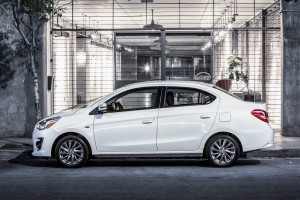
Mitsubishi recently launched a new version of the Mirage in the U.S., emphasizing price and mileage.
Even as an internal investigation into fuel economy ratings fraud gets underway, Mitsubishi Motors Corp. claims the mileage numbers used for vehicles sold in the United States have been accurate.
That word comes just a day after the embattled Japanese automaker acknowledged it had inflated the figures for vehicles sold in its home market since at least 1991. Sales of Mitsubishi vehicles have plunged since the scandal broke earlier this month, while the maker’s stock price has fallen by nearly half.
Mitsubishi is a relatively minor player in the American market, but coming in the wake of a series of industry ethics lapses – including the Volkswagen diesel emissions fraud and General Motors’ cover-up of a deadly ignition switch defect – the Japanese maker could face major fines and legal costs if it were found to be cheating in the U.S., as well.
The mileage scam first erupted when Nissan Motor Co. said it discovered irregularities in the mileage data for two of the models it sells, the Dayz and Dayz Roox, in Japan. Both of those microcars are actually produced by Mitsubishi. The smaller maker subsequently acknowledged it had rigged fuel economy tests for the two Nissan models, as well as two of its own vehicles, the eK Space and eK Wagon.
On Wednesday, Mitsubishi President and Chief Operating Officer Tetsuro Aikawa revealed that the company’s engineers were using U.S. test procedures that involve more open highway driving. That artificially boosted the apparent mileage of the microcars, which are largely sold based on price and fuel economy.
Aikawa – who will reportedly resign, along with Chairman Osamu Masuko – told reporters a panel consisting of three lawyers, including a former prosecutor, had been empowered to dig into the scandal to see just how widespread the cheating was. They are expected to issue a final report within three months.
(Mileage scandal expected to lead to ouster of top Mitsubishi execs. Click Here for the story.)
But a separate investigation has also been launched by the Japanese transport ministry. The government this week raided a Mitsubishi engineering lab seeking evidence. Rigging fuel economy tests could lead to criminal charges in Mitsubishi’s home market.
It could lead to penalties and more in the U.S., as well. Government regulators fined Korean siblings Kia and Hyundai several years ago when the parent company admitted it had misstated fuel economy numbers on some models by up to 6 mpg. The two brands also settled lawsuits and issued compensation to American owners. Ford Motor Co. subsequently restated mileage on some of its products sold in the U.S., as well.
(Mitsubishi cheated on mileage numbers for 25 years. For more, Click Here.)
Mitsubishi’s credibility, even as it openly acknowledges the mileage test cheating, is suspect, at best, industry observers contend. The maker was caught in a separate scandal a dozen years back when it was revealed it had covered up a series of safety problems associated with at least one death.
And some major financial problems nearly wrecked the company earlier this decade, forcing a consortium of Japanese banks to come in and rescue the automaker.
Shareholders have abandoned Mitsubishi in large numbers since the mileage scandal first broke, its stock price plunging by nearly half – equivalent to a loss of about $3.7 billion in market valuation. But bargain hunters helped fuel a modest, 8% recovery on the Japanese stock market on Thursday.
So far, Mitsubishi has identified only four models impacted by the cheating, all sold in Japan where there is a huge market for high-mileage microcars. How the scandal will impact the company’s sales abroad could take time to ascertain.
Mitsubishi is currently one of the smallest Japanese brands on the U.S. market – American sales accounting for about 13% of the company’s global total. A new version of the Mirage was recently launched in the States, as was an updated version of the Outlander SUV. A plug-in version of the Outlander is set to follow. As in Japan, Mitsubishi focuses on value-oriented buyers focused on high mileage, so any hint that it has rigged its numbers in the U.S. could pose serious problems.
(VW takes $18.2 bil hit for diesel scandal. But cost likely to rise. Click Here for the latest.)


